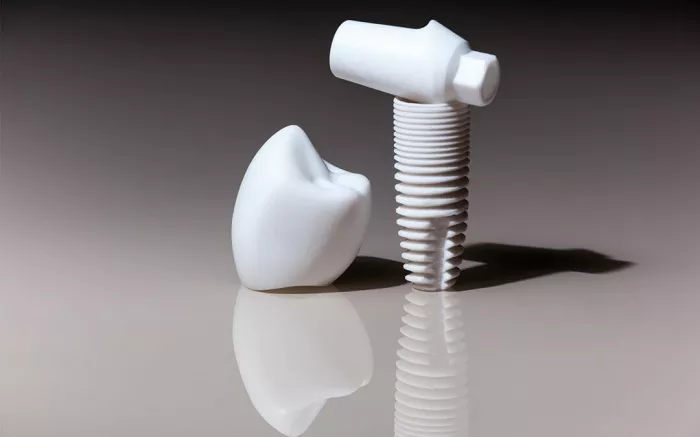Zirconia dental implants have emerged as a strong alternative to traditional titanium implants. Made from zirconium dioxide, a biocompatible ceramic material, they offer aesthetic appeal and excellent strength. As patients seek metal-free solutions, zirconia has become increasingly popular. However, an essential concern remains—how long do zirconia implants last? This article explores the durability, factors influencing longevity, and how conditions such as gingivitis, gum disease, and sensitive teeth impact their success.
What Are Zirconia Implants?
Zirconia implants are a type of dental implant used to replace missing teeth. Unlike titanium implants, zirconia is metal-free and tooth-colored, making it ideal for patients with metal sensitivities or aesthetic preferences. Zirconia offers excellent strength, resistance to corrosion, and minimal bacterial adhesion.
Average Lifespan of Zirconia Implants
Under ideal conditions, zirconia implants can last 15 to 25 years or longer. Clinical data supports high survival rates, with studies showing over 90% success rates over a 10-year span. However, implant longevity depends on various personal and clinical factors.
Factors That Influence Implant Longevity
Oral Hygiene
Proper oral hygiene is critical. Brushing and flossing regularly prevents plaque buildup, reducing the risk of gum disease and gingivitis. Poor hygiene leads to peri-implantitis, which can cause implant failure.
Gum Health
Healthy gums provide a strong foundation for implants. Conditions like gingivitis and gum disease weaken the tissue and bone supporting the implant. Untreated gum disease increases the risk of implant loosening and eventual loss.
Bone Density and Volume
Implants must be placed in strong, sufficient bone. Patients with bone loss may need bone grafting. Insufficient bone can compromise the implant’s stability and shorten its lifespan.
Dental Habits
Clenching, grinding, or chewing hard objects can damage the implant crown or implant itself. Wearing a nightguard and avoiding harmful habits can extend implant life.
Smoking
Nicotine reduces blood flow, delays healing, and increases infection risk. Smokers have a higher failure rate with dental implants compared to non-smokers.
Diet and Nutrition
A diet rich in vitamins and minerals supports tissue healing and immune response. Sugary foods and acidic drinks promote decay and infection, which can jeopardize implant health.
Systemic Health Conditions
Diabetes, autoimmune disorders, and osteoporosis may affect healing and implant integration. Regular medical and dental checkups are essential for these patients.
Comparison with Titanium Implants
Titanium implants have decades of clinical success and typically last 20-30 years. Zirconia offers similar longevity but fewer long-term studies exist. However, zirconia is more aesthetic and less prone to bacterial adhesion, reducing the risk of inflammation.
Role of Gingivitis and Gum Disease
Gingivitis is the early stage of gum disease, characterized by red, swollen, bleeding gums. If untreated, it progresses to periodontitis, leading to bone loss. Zirconia implants may resist bacteria better than titanium, but they are still vulnerable to infection if oral hygiene is poor.
Regular dental cleanings and checkups are vital. Dentists monitor for signs of gum disease and ensure the implant remains stable. Addressing gingivitis early protects the surrounding tissues and preserves implant health.
Sensitive Teeth and Implants
Patients with sensitive teeth may wonder about sensitivity after implant placement. Zirconia implants do not have nerves, so the implant itself won’t feel sensitivity. However, surrounding gums or adjacent natural teeth can experience sensitivity, especially during healing.
Good oral care and using desensitizing toothpaste can help manage symptoms. Sensitivity usually resolves as tissues adapt post-surgery.
Maintenance and Care Tips
Daily Oral Hygiene
- Use a soft-bristled toothbrush twice daily
- Floss around implants with special floss or interdental brushes
- Rinse with antibacterial mouthwash
Regular Dental Visits
Visit the dentist every six months for professional cleaning and assessment. Early detection of issues ensures long-term success.
Protective Devices
Wear a mouthguard if you grind your teeth. Avoid biting hard objects like ice or pens.
When Do Zirconia Implants Fail?
Though rare, implant failure may occur due to:
- Poor osseointegration (failure to fuse with bone)
- Infection from untreated gingivitis or gum disease
- Overloading from biting stress
- Material fracture under extreme forces
Signs of failure include implant mobility, persistent pain, or gum recession. Early intervention can sometimes save a compromised implant.
Advantages of Zirconia Implants
- Aesthetic Appeal: Tooth-colored appearance blends with natural teeth
- Biocompatibility: Minimal risk of allergic reactions
- Low Bacterial Adhesion: Reduces gum inflammation risk
- Corrosion-Resistant: No metal corrosion over time
Disadvantages to Consider
Limited Long-Term Data: Less historical data than titanium
One-Piece Design: Fewer adjustment options during placement
Higher Cost: May be more expensive than titanium alternatives
The Importance of the Dental Implants Process
The implant process significantly impacts the longevity of zirconia implants. The Dental Implants Process includes evaluation, surgical placement, healing, and restoration. Precision during each step enhances integration and minimizes complications.
Pre-operative planning includes assessing bone density, evaluating for signs of gingivitis or sensitive teeth, and reviewing medical history. Surgery must be performed under sterile conditions with proper torque and positioning.
Post-operative care involves healing monitoring, inflammation control, and checking for infection signs. Each stage contributes to the implant’s long-term stability.
How to Know If You’re a Good Candidate
Ideal candidates have:
- Good overall health
- Healthy gums without active gum disease
- Adequate bone volume
- Commitment to oral hygiene
- Non-smokers or willing to quit
Patients with diabetes or autoimmune issues may still qualify with proper medical management.
Conclusion
Zirconia implants are a durable, aesthetic, and biocompatible solution for tooth replacement. With proper care, they can last over two decades. However, their longevity depends on oral hygiene, systemic health, and implant care.
Addressing conditions like gingivitis, sensitive teeth, and gum disease early ensures long-term success. Regular dental visits, good habits, and understanding the Dental Implants Process are key to protecting your investment. As zirconia continues to gain popularity, more patients can enjoy lasting, natural-looking smiles free from metal.

